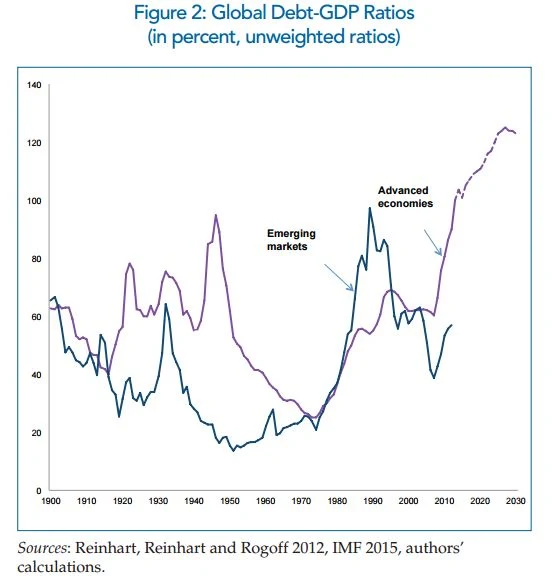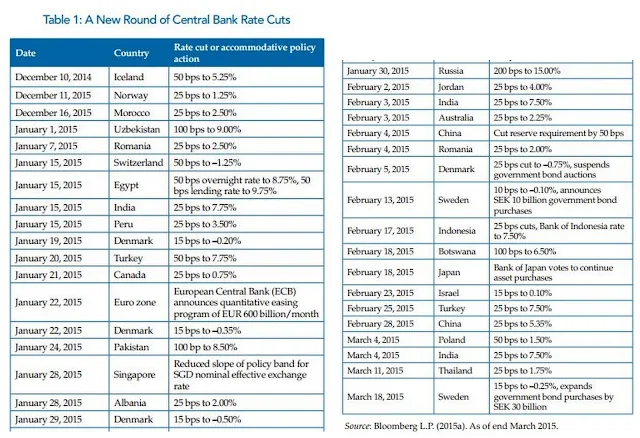The need to improve the tools we use to deal with sovereign debt crises has been made particularly urgent by the accumulation of massive public debt stocks and balance sheet vulnerabilities in the wake of the 2008 financial crisis and the 2010 euro-zone crisis (Dobbs et al. 2015).
By Richard Gitlin and Brett House
The need to
improve the tools we use to deal with sovereign debt crises has been made
particularly urgent by the accumulation of massive public debt stocks and
balance sheet vulnerabilities in the wake of the 2008 financial crisis and the
2010 euro-zone crisis (Dobbs et al. 2015).
Following the
failures of Bear Stearns in 2007 and Lehman Brothers in 2008, central banks and
finance ministries pumped massive amounts of liquidity into credit markets to
prevent their breakdown. Concerns raised about Greece’s solvency in late 2009,
and weak activity in many other real economies, resulted in further application
of exceptional monetary and fiscal measures in the ensuing years. As the Bank
for International Settlements (BIS) highlights (BIS 2014a; 2014b), private debt
issuance more or less ground to a halt in 2007 and public debt then expanded
massively, taking the global debt securities market from just over US$60
trillion in 2007 to about US$100 trillion by 2013 (see Figure 1).
Figure 1: Global Debt Securities Market
(in US$ trillion)
The mountain of
sovereign debt created in recent years leaves little room to cushion the impact
of a policy mistake or respond to a new exogenous shock.Global vulnerabilities
extend far beyond Europe’s continued saga with Greece. The aggregate debt-GDP
ratio for all advanced countries has returned to historic highs above 100
percent (Figure 2) — a level that in the past has been associated with
heightened geopolitical tensions, liquidity problems and insolvency (Reinhart
and Rogoff 2009; 2011; 2013; James 2014).
Figure 2: Global
Debt-GDP Ratios (in percent, unweighted ratios)
This situation is not set to reverse
itself quickly. Globally, real activity is not rebounding strongly as fiscal
stimulus ebbs and investment in public infrastructure falls to new lows
(Summers 2015; Wessel 2015), despite IMF (2014d) evidence that every dollar of
well-planned public investment can increase total output threefold. More than
20 central banks have returned to cutting interest rates and easing monetary
conditions (BIS 2015; also see Table 1). Whether these are genuine responses to
weakness in domestic economies or cloaked attempts to devalue against the US
dollar in a diffuse currency war, uncoordinated monetary easing of this sort
raises the possibility of beggar-thy-neighbour trade protectionism that could
cut global growth prospects further (Rajan 2014).
Table 1: A New
Round of Central Bank Rate Cuts
Medium-term
secular trends imply that heavily indebted developed-economy sovereigns will
not find the years ahead much easier. A gathering imperfect storm of
insufficient stimulus measures, impaired credit-creation mechanisms,
deleveraging across a range of sectoral balance sheets (Koo 2014) and aging
populations could entrench secular stagnation (Summers 2013; 2014a; Lagarde
2015a) and make real debt burdens even more onerous across advanced economies.
The GDP denominator in high debt-GDP ratios is unlikely to bring down these
ratios any time soon. At the same time, there’s little room to pare the debt
numerator.
The IMF (2011b) shows that, ceteris paribus, many advanced countries
would need fiscal surpluses well in excess of recent decanal averages in order
to bring debt-GDP ratios down to 60 percent of GDP from their existing levels
over the next 10 years. Where countries have prepared plans to achieve such
surpluses, they will be technically and politically difficult to execute, as
Barry Eichengreen and Ugo Panizza (2014) underscore. Moreover, if all or even
most advanced countries target fiscal austerity at the same time, global growth
prospects would be dented further and revenue projections would likely not be
realized.
The Organisation for Economic Co-operation and Development (OECD)
(2013) and IMF (2014b) have projected primary deficits in the neighbourhood of
3.5 percent of GDP over the next five to 10 years, as age-related health,
long-term care and pension spending are set to expand by an average of between
5.5 and 10 percent of GDP in advanced economies (IMF 2012c; 2014a). Running
these projections through a basic model built on the IMF’s debt sustainability
analysis (DSA) template implies that advanced-country debt-GDP ratios could
continue to rise to over 120 percent of GDP by 2030 (see Figure 2).
Past experience
implies that at these debt levels advanced sovereigns would likely face
substantially increased risks of default. As Carmen Reinhart and Kenneth Rogoff
(2009) show, sovereign debt restructuring has historically been more the norm
than the exception: in nearly any given year over the last century, some
country has been in default or in the process of restructuring its debt. At
current and expected advanced-country debt levels, sovereign debt crises look
nearly inevitable when set against past developments.
Of course, it’s possible
that some combination of tougher capital adequacy standards under Basel III and
related local legislation will stoke demand for near risk-free assets and
sustain bids for new sovereign debt issuance. But it would be deeply imprudent
to orient international economic policy making around this faint hope.
Moreover, as demonstrated by the recent crises in Iceland, Ireland and Spain,
and the late-1990s Asian crisis before them, private-sector debt problems and
balance sheet mismatches can quickly morph into sovereign debt problems.
National accounts likely understate the extent to which corporate
foreign-currency borrowing has expanded through issuance in the domestic
markets of overseas subsidiaries (Shin and Zhao 2013; Wheatley 2014; Nordvig
and Fritz 2014). To paraphrase Reinhart and Rogoff, the next time is unlikely
to be different.
The fact that
much of the recent run-up in advanced country debt is linked to domestic
issuance should provide limited comfort. Although domestically denominated debt
can be inflated away, and debt issued under domestic law is typically easier to
restructure than foreign-law debt, domestic debt can still be a source of
substantial vulnerabilities (Panizza 2007), although these weaknesses may be
less pronounced than those engendered by foreign currency and foreign-law debt
(Dell’Erba, Hausmann and Panizza 2013). Cross-sector and cross-border maturity
and currency mismatches in private and public domestic debt stocks can expose
sovereigns to substantial risks, some of which precipitated sovereign debt
crises in the late 1990s and early 2000s, as detailed by Christoph Rosenberg et
al. (2005).
One of the few
ways in which the next set of sovereign debt crises could genuinely be
different is in the much wider range of countries that could be involved.
Several relatively poor countries, rebranded as “frontier markets,” have in
recent years made their debut issues on international capital markets with
offerings that have been multiple times oversubscribed as investors eschew
meaningful distinctions in credit quality in their search for yield. Ghana was
able to issue an oversubscribed US$1 billion bond in September 2014, one month
after its decision to seek help from the IMF. Even Ecuador returned to capital
markets in 2014 after capricious unilateral defaults in 2008 and 2009 on
international obligations it considered “illegitimate.” Until 2006, South
Africa was the only Sub-Saharan African country that had issued an external
sovereign bond. Since then, 12 Sub-Saharan African countries have issued more
than US$17 billion in external bond debt (see Table 2); three more countries
have made private external placements during this time: Mozambique and Angola
(2012), and Tanzania (2013).
Table 2: African
Frontier Market External Debt Issuance (excluding private placements)
Eight of these African countries had most of their
external debt written off only a few years earlier under the HIPC and
Multilateral Debt Relief Initiative (MDRI) restructuring programs. Some of
these countries are indeed much more credit worthy than they were even a decade
ago: democratic governance, economic performance and natural resource
management have improved markedly in many of them. But all frontier markets
face a substantial risk that they will encounter higher interest rates when it
comes time to roll over their recent bond issues. Even now, some 40 poor
developing countries, many of whom benefited from HIPC and MDRI debt relief,
are in medium to severe debt distress (Table 3; IMF 2014e; Kaiser 2014). The
next debt crisis is already brewing.
Table 3 : Incipient Sovereign Debt Distress in
Heavily Indebted Poor Countries (HIPC)
The end of US
quantitative easing (QE) and signals of a coming Federal Reserve rate increase
make efforts to improve the non-system of sovereign debt restructuring
particularly time sensitive (Chung et al. 2014). Although there is evidence
that good policy regimes provide some insulation against taper-induced
pullbacks (Mishra et al. 2014), the “taper tantrum” of 2013 tended to hit
emerging markets indiscriminately (Eichengreen and Gupta 2013) and, in some
cases, countries with better policy frameworks saw relatively larger outflows
as these economies also tend to have the most liquid, easily exited markets.
Looking at earlier rounds of Fed tightening, Joseph Capurso (2014) notes the
collateral damage on emerging markets is often most intense about one year
after Fed policy has been made less accommodative, particularly in countries with
large current-account deficits and banking systems particularly dependent on
foreign wholesale financing. The Institute of International Finance’s (IIF’s)
models anticipate three or four emerging-markets crises each year in which the
US Fed tightens monetary policy, up from the 40-year average of 1.7 crises each
year (IIF 2015). The BIS (2014b) has already sounded warnings about the impact
of higher US yields and a stronger dollar on global debt stocks. In March 2015,
the IMF’s managing director, Christine Lagarde (2015b), cautioned that the 2013
tantrum was not a one-off episode and called on both advanced and emerging
economies to get prepared for increased volatility ahead.
Solving the
financing problems of emerging markets ultimately requires better domestic
policy regimes to win the confidence of their own investors: improvements in
debt restructuring systems deal with symptoms rather than the root causes of
sovereign debt distress. Over long spans, the world’s main concern shouldn’t be
temporary pullbacks during yield increases in the United States, but rather the
secular tendency for capital to flow in the wrong direction between advanced
and emerging economies: more capital consistently heads out of emerging markets
than into them. Rather than a home bias, emerging-market public investors, in
particular sovereign wealth funds and central bank reserve managers, tend to
maintain a foreign bias that goes hand-in-hand with the ongoing stain of
“original sin,” the inability of many emerging-market sovereigns to borrow
domestically or abroad over long tenors at fixed rates in their own currency
(Eichengreen, Hausmann and Panizza 2002; 2007).
Capurso (2014) notes that
emerging market public investors’ assets under management rose from US$3
trillion in 2007 to US$11 trillion in 2012, with most of this devoted to
advanced economies. The roughly US$8 trillion in flows from emerging markets to
advanced economies allocated by emerging market asset managers from 2007 to
2012 was about 10 times greater than the US$0.8 trillion in developed-market
flows pushed by the search for yield into emerging markets during this
five-year span. Any improvement in sovereign debt restructuring regimes should,
therefore, be accompanied by better ongoing domestic economic policy making in
emerging markets, rather than continued pressure on the IMF to endorse capital
controls (IMF 2011a; 2012a).
About The Authors:
Richard Gitlin
joined the Centre for International Governance Innovation (CIGI) as a senior
fellow in June 2013. He played a leading role in the development of practices
and procedures for successfully resolving complex global restructuring and
insolvency cases. Richard has served as adviser to several countries regarding
the modernization of their insolvency laws, including Canada, Korea, Indonesia,
Mexico and the United States, as well as the International Monetary Fund (IMF)
in connection with corporate and sovereign restructuring reform.
Brett House is a
senior fellow at the Jeanne Sauvé Foundation and a visiting scholar at Massey
College, University of Toronto. He is also an adviser at Tau Investment
Management, a startup impact fund. This special report was initiated during his
tenure as a senior fellow at CIGI.
Publication Details:
This work is an
extract from "JUST ENOUGH, JUST IN TIME Improving Sovereign Debt Restructuring
for Creditors, Debtors and Citizens" (Special Report) by Richard Gitlin and
Brett House. Download the Report - LINK
This work is
licensed by the Original Publisher – Center for International Governance and
Innovation, under a Creative Commons Attribution — Non-commercial — No
Derivatives License. To view this license, visit (www.creativecommons.org/
licenses/by-nc-nd/3.0/).










.jpg)












